Heart Failure Care Confederation: Benefits & Management
VerifiedAdded on 2020/07/22
|7
|2121
|125
AI Summary
This assignment details the benefits of confederation in improving heart failure patient outcomes. It outlines effective care steps and assessment necessities, emphasizing the significance of nursing management for effective treatment. The study draws on various references from books, journals, and online sources to provide a comprehensive understanding of the topic.
Contribute Materials
Your contribution can guide someone’s learning journey. Share your
documents today.
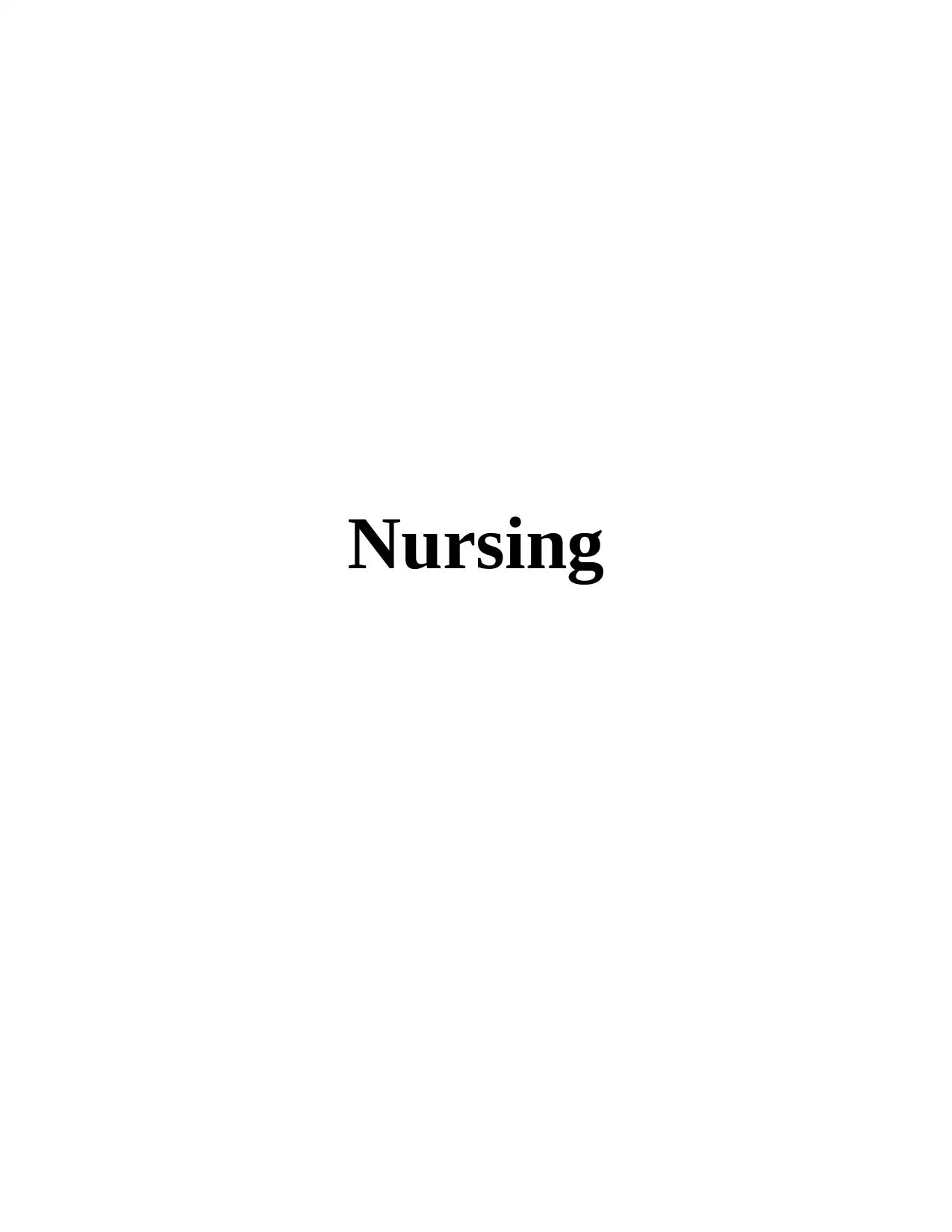
Nursing
Secure Best Marks with AI Grader
Need help grading? Try our AI Grader for instant feedback on your assignments.

TABLE OF CONTENTS
INTRODUCTION...........................................................................................................................1
MAIN BODY...................................................................................................................................1
CONLUSIONS................................................................................................................................4
REFERENCES................................................................................................................................5
INTRODUCTION...........................................................................................................................1
MAIN BODY...................................................................................................................................1
CONLUSIONS................................................................................................................................4
REFERENCES................................................................................................................................5
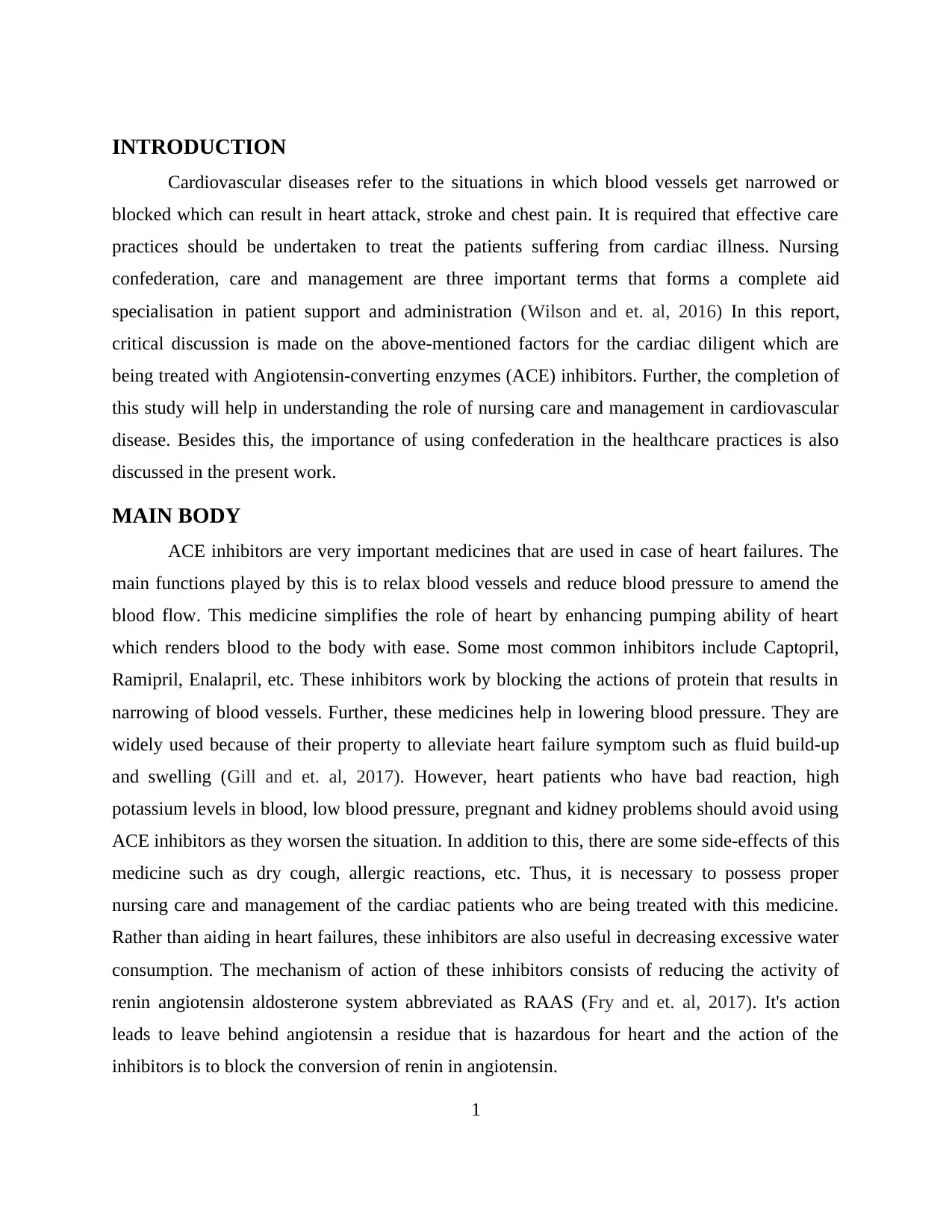
INTRODUCTION
Cardiovascular diseases refer to the situations in which blood vessels get narrowed or
blocked which can result in heart attack, stroke and chest pain. It is required that effective care
practices should be undertaken to treat the patients suffering from cardiac illness. Nursing
confederation, care and management are three important terms that forms a complete aid
specialisation in patient support and administration (Wilson and et. al, 2016) In this report,
critical discussion is made on the above-mentioned factors for the cardiac diligent which are
being treated with Angiotensin-converting enzymes (ACE) inhibitors. Further, the completion of
this study will help in understanding the role of nursing care and management in cardiovascular
disease. Besides this, the importance of using confederation in the healthcare practices is also
discussed in the present work.
MAIN BODY
ACE inhibitors are very important medicines that are used in case of heart failures. The
main functions played by this is to relax blood vessels and reduce blood pressure to amend the
blood flow. This medicine simplifies the role of heart by enhancing pumping ability of heart
which renders blood to the body with ease. Some most common inhibitors include Captopril,
Ramipril, Enalapril, etc. These inhibitors work by blocking the actions of protein that results in
narrowing of blood vessels. Further, these medicines help in lowering blood pressure. They are
widely used because of their property to alleviate heart failure symptom such as fluid build-up
and swelling (Gill and et. al, 2017). However, heart patients who have bad reaction, high
potassium levels in blood, low blood pressure, pregnant and kidney problems should avoid using
ACE inhibitors as they worsen the situation. In addition to this, there are some side-effects of this
medicine such as dry cough, allergic reactions, etc. Thus, it is necessary to possess proper
nursing care and management of the cardiac patients who are being treated with this medicine.
Rather than aiding in heart failures, these inhibitors are also useful in decreasing excessive water
consumption. The mechanism of action of these inhibitors consists of reducing the activity of
renin angiotensin aldosterone system abbreviated as RAAS (Fry and et. al, 2017). It's action
leads to leave behind angiotensin a residue that is hazardous for heart and the action of the
inhibitors is to block the conversion of renin in angiotensin.
1
Cardiovascular diseases refer to the situations in which blood vessels get narrowed or
blocked which can result in heart attack, stroke and chest pain. It is required that effective care
practices should be undertaken to treat the patients suffering from cardiac illness. Nursing
confederation, care and management are three important terms that forms a complete aid
specialisation in patient support and administration (Wilson and et. al, 2016) In this report,
critical discussion is made on the above-mentioned factors for the cardiac diligent which are
being treated with Angiotensin-converting enzymes (ACE) inhibitors. Further, the completion of
this study will help in understanding the role of nursing care and management in cardiovascular
disease. Besides this, the importance of using confederation in the healthcare practices is also
discussed in the present work.
MAIN BODY
ACE inhibitors are very important medicines that are used in case of heart failures. The
main functions played by this is to relax blood vessels and reduce blood pressure to amend the
blood flow. This medicine simplifies the role of heart by enhancing pumping ability of heart
which renders blood to the body with ease. Some most common inhibitors include Captopril,
Ramipril, Enalapril, etc. These inhibitors work by blocking the actions of protein that results in
narrowing of blood vessels. Further, these medicines help in lowering blood pressure. They are
widely used because of their property to alleviate heart failure symptom such as fluid build-up
and swelling (Gill and et. al, 2017). However, heart patients who have bad reaction, high
potassium levels in blood, low blood pressure, pregnant and kidney problems should avoid using
ACE inhibitors as they worsen the situation. In addition to this, there are some side-effects of this
medicine such as dry cough, allergic reactions, etc. Thus, it is necessary to possess proper
nursing care and management of the cardiac patients who are being treated with this medicine.
Rather than aiding in heart failures, these inhibitors are also useful in decreasing excessive water
consumption. The mechanism of action of these inhibitors consists of reducing the activity of
renin angiotensin aldosterone system abbreviated as RAAS (Fry and et. al, 2017). It's action
leads to leave behind angiotensin a residue that is hazardous for heart and the action of the
inhibitors is to block the conversion of renin in angiotensin.
1
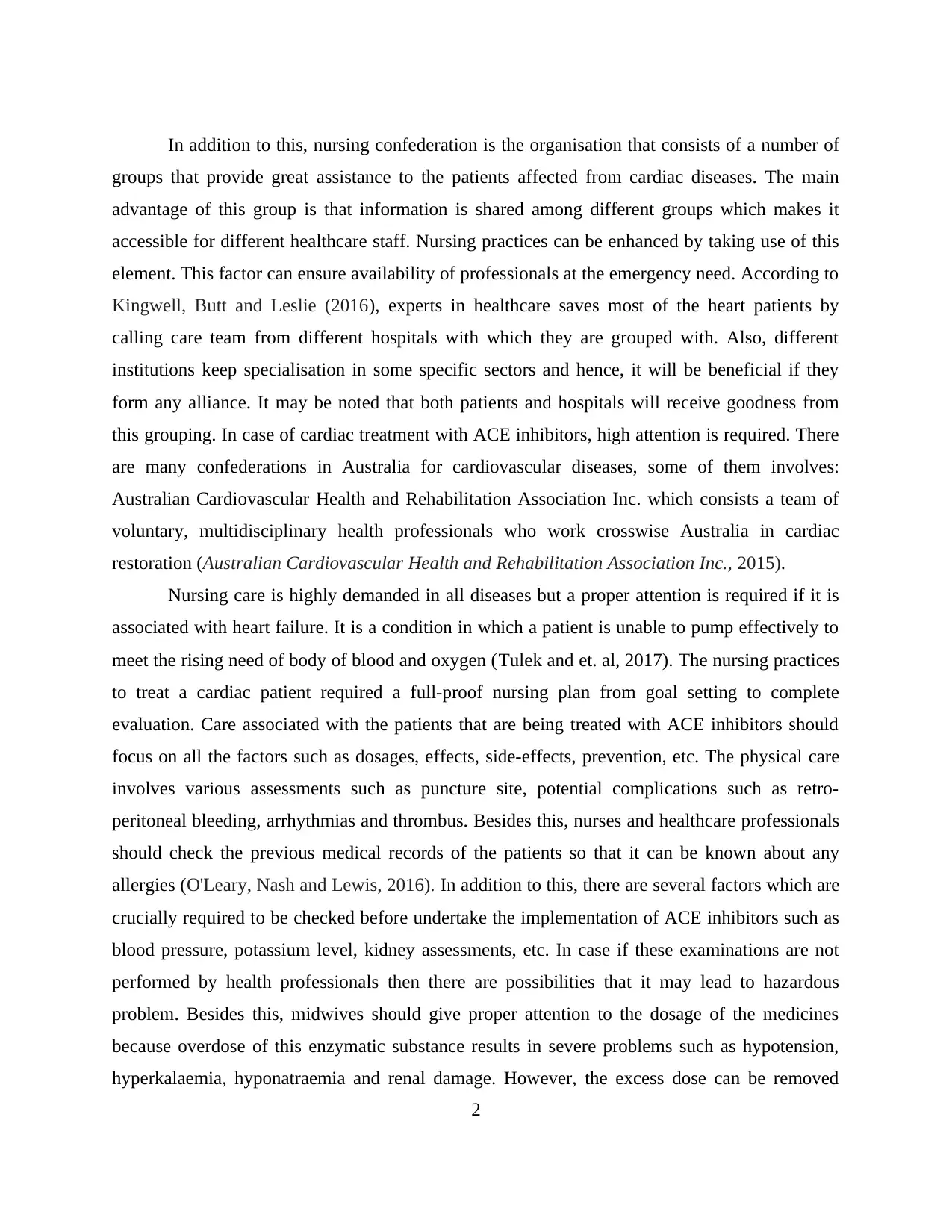
In addition to this, nursing confederation is the organisation that consists of a number of
groups that provide great assistance to the patients affected from cardiac diseases. The main
advantage of this group is that information is shared among different groups which makes it
accessible for different healthcare staff. Nursing practices can be enhanced by taking use of this
element. This factor can ensure availability of professionals at the emergency need. According to
Kingwell, Butt and Leslie (2016), experts in healthcare saves most of the heart patients by
calling care team from different hospitals with which they are grouped with. Also, different
institutions keep specialisation in some specific sectors and hence, it will be beneficial if they
form any alliance. It may be noted that both patients and hospitals will receive goodness from
this grouping. In case of cardiac treatment with ACE inhibitors, high attention is required. There
are many confederations in Australia for cardiovascular diseases, some of them involves:
Australian Cardiovascular Health and Rehabilitation Association Inc. which consists a team of
voluntary, multidisciplinary health professionals who work crosswise Australia in cardiac
restoration (Australian Cardiovascular Health and Rehabilitation Association Inc., 2015).
Nursing care is highly demanded in all diseases but a proper attention is required if it is
associated with heart failure. It is a condition in which a patient is unable to pump effectively to
meet the rising need of body of blood and oxygen (Tulek and et. al, 2017). The nursing practices
to treat a cardiac patient required a full-proof nursing plan from goal setting to complete
evaluation. Care associated with the patients that are being treated with ACE inhibitors should
focus on all the factors such as dosages, effects, side-effects, prevention, etc. The physical care
involves various assessments such as puncture site, potential complications such as retro-
peritoneal bleeding, arrhythmias and thrombus. Besides this, nurses and healthcare professionals
should check the previous medical records of the patients so that it can be known about any
allergies (O'Leary, Nash and Lewis, 2016). In addition to this, there are several factors which are
crucially required to be checked before undertake the implementation of ACE inhibitors such as
blood pressure, potassium level, kidney assessments, etc. In case if these examinations are not
performed by health professionals then there are possibilities that it may lead to hazardous
problem. Besides this, midwives should give proper attention to the dosage of the medicines
because overdose of this enzymatic substance results in severe problems such as hypotension,
hyperkalaemia, hyponatraemia and renal damage. However, the excess dose can be removed
2
groups that provide great assistance to the patients affected from cardiac diseases. The main
advantage of this group is that information is shared among different groups which makes it
accessible for different healthcare staff. Nursing practices can be enhanced by taking use of this
element. This factor can ensure availability of professionals at the emergency need. According to
Kingwell, Butt and Leslie (2016), experts in healthcare saves most of the heart patients by
calling care team from different hospitals with which they are grouped with. Also, different
institutions keep specialisation in some specific sectors and hence, it will be beneficial if they
form any alliance. It may be noted that both patients and hospitals will receive goodness from
this grouping. In case of cardiac treatment with ACE inhibitors, high attention is required. There
are many confederations in Australia for cardiovascular diseases, some of them involves:
Australian Cardiovascular Health and Rehabilitation Association Inc. which consists a team of
voluntary, multidisciplinary health professionals who work crosswise Australia in cardiac
restoration (Australian Cardiovascular Health and Rehabilitation Association Inc., 2015).
Nursing care is highly demanded in all diseases but a proper attention is required if it is
associated with heart failure. It is a condition in which a patient is unable to pump effectively to
meet the rising need of body of blood and oxygen (Tulek and et. al, 2017). The nursing practices
to treat a cardiac patient required a full-proof nursing plan from goal setting to complete
evaluation. Care associated with the patients that are being treated with ACE inhibitors should
focus on all the factors such as dosages, effects, side-effects, prevention, etc. The physical care
involves various assessments such as puncture site, potential complications such as retro-
peritoneal bleeding, arrhythmias and thrombus. Besides this, nurses and healthcare professionals
should check the previous medical records of the patients so that it can be known about any
allergies (O'Leary, Nash and Lewis, 2016). In addition to this, there are several factors which are
crucially required to be checked before undertake the implementation of ACE inhibitors such as
blood pressure, potassium level, kidney assessments, etc. In case if these examinations are not
performed by health professionals then there are possibilities that it may lead to hazardous
problem. Besides this, midwives should give proper attention to the dosage of the medicines
because overdose of this enzymatic substance results in severe problems such as hypotension,
hyperkalaemia, hyponatraemia and renal damage. However, the excess dose can be removed
2
Secure Best Marks with AI Grader
Need help grading? Try our AI Grader for instant feedback on your assignments.
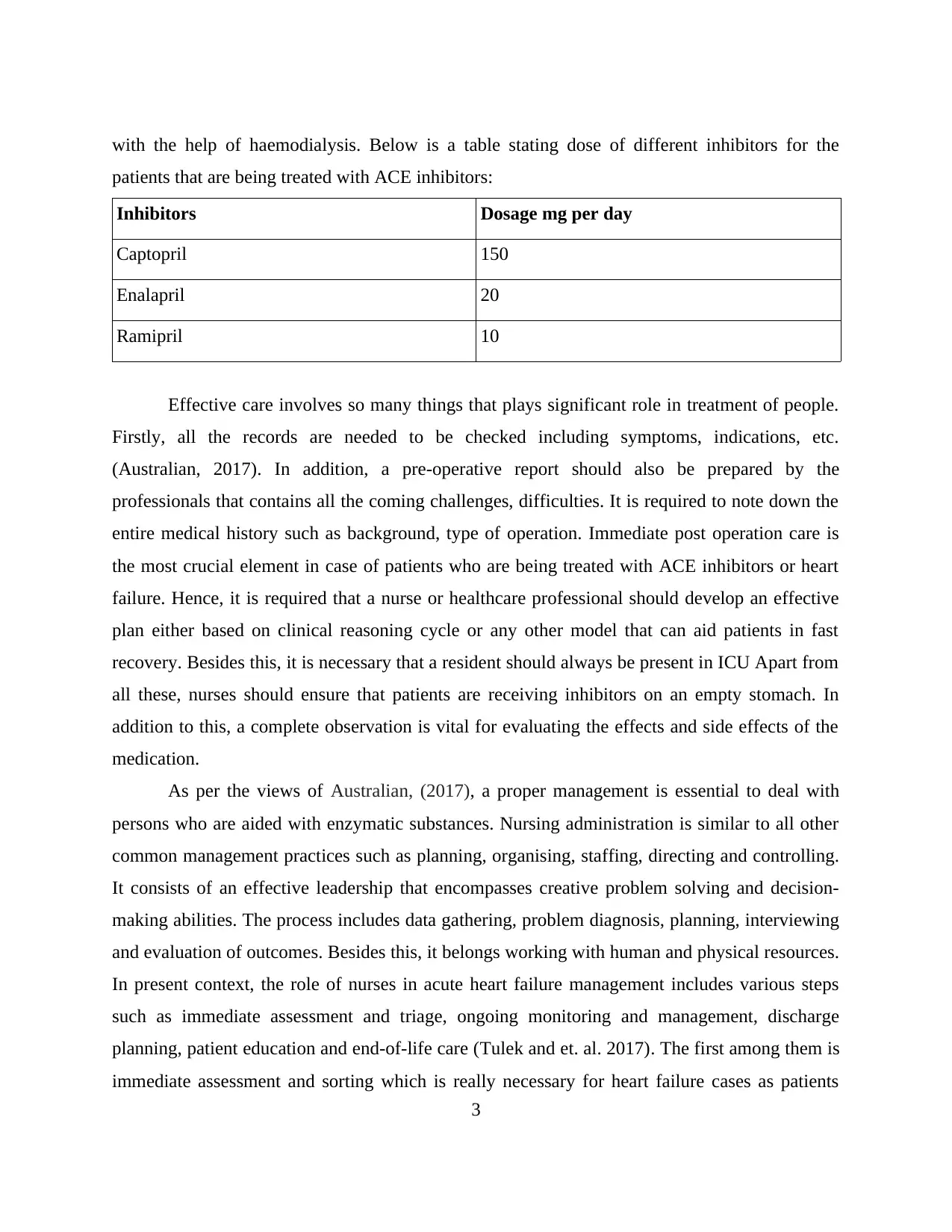
with the help of haemodialysis. Below is a table stating dose of different inhibitors for the
patients that are being treated with ACE inhibitors:
Inhibitors Dosage mg per day
Captopril 150
Enalapril 20
Ramipril 10
Effective care involves so many things that plays significant role in treatment of people.
Firstly, all the records are needed to be checked including symptoms, indications, etc.
(Australian, 2017). In addition, a pre-operative report should also be prepared by the
professionals that contains all the coming challenges, difficulties. It is required to note down the
entire medical history such as background, type of operation. Immediate post operation care is
the most crucial element in case of patients who are being treated with ACE inhibitors or heart
failure. Hence, it is required that a nurse or healthcare professional should develop an effective
plan either based on clinical reasoning cycle or any other model that can aid patients in fast
recovery. Besides this, it is necessary that a resident should always be present in ICU Apart from
all these, nurses should ensure that patients are receiving inhibitors on an empty stomach. In
addition to this, a complete observation is vital for evaluating the effects and side effects of the
medication.
As per the views of Australian, (2017), a proper management is essential to deal with
persons who are aided with enzymatic substances. Nursing administration is similar to all other
common management practices such as planning, organising, staffing, directing and controlling.
It consists of an effective leadership that encompasses creative problem solving and decision-
making abilities. The process includes data gathering, problem diagnosis, planning, interviewing
and evaluation of outcomes. Besides this, it belongs working with human and physical resources.
In present context, the role of nurses in acute heart failure management includes various steps
such as immediate assessment and triage, ongoing monitoring and management, discharge
planning, patient education and end-of-life care (Tulek and et. al. 2017). The first among them is
immediate assessment and sorting which is really necessary for heart failure cases as patients
3
patients that are being treated with ACE inhibitors:
Inhibitors Dosage mg per day
Captopril 150
Enalapril 20
Ramipril 10
Effective care involves so many things that plays significant role in treatment of people.
Firstly, all the records are needed to be checked including symptoms, indications, etc.
(Australian, 2017). In addition, a pre-operative report should also be prepared by the
professionals that contains all the coming challenges, difficulties. It is required to note down the
entire medical history such as background, type of operation. Immediate post operation care is
the most crucial element in case of patients who are being treated with ACE inhibitors or heart
failure. Hence, it is required that a nurse or healthcare professional should develop an effective
plan either based on clinical reasoning cycle or any other model that can aid patients in fast
recovery. Besides this, it is necessary that a resident should always be present in ICU Apart from
all these, nurses should ensure that patients are receiving inhibitors on an empty stomach. In
addition to this, a complete observation is vital for evaluating the effects and side effects of the
medication.
As per the views of Australian, (2017), a proper management is essential to deal with
persons who are aided with enzymatic substances. Nursing administration is similar to all other
common management practices such as planning, organising, staffing, directing and controlling.
It consists of an effective leadership that encompasses creative problem solving and decision-
making abilities. The process includes data gathering, problem diagnosis, planning, interviewing
and evaluation of outcomes. Besides this, it belongs working with human and physical resources.
In present context, the role of nurses in acute heart failure management includes various steps
such as immediate assessment and triage, ongoing monitoring and management, discharge
planning, patient education and end-of-life care (Tulek and et. al. 2017). The first among them is
immediate assessment and sorting which is really necessary for heart failure cases as patients
3
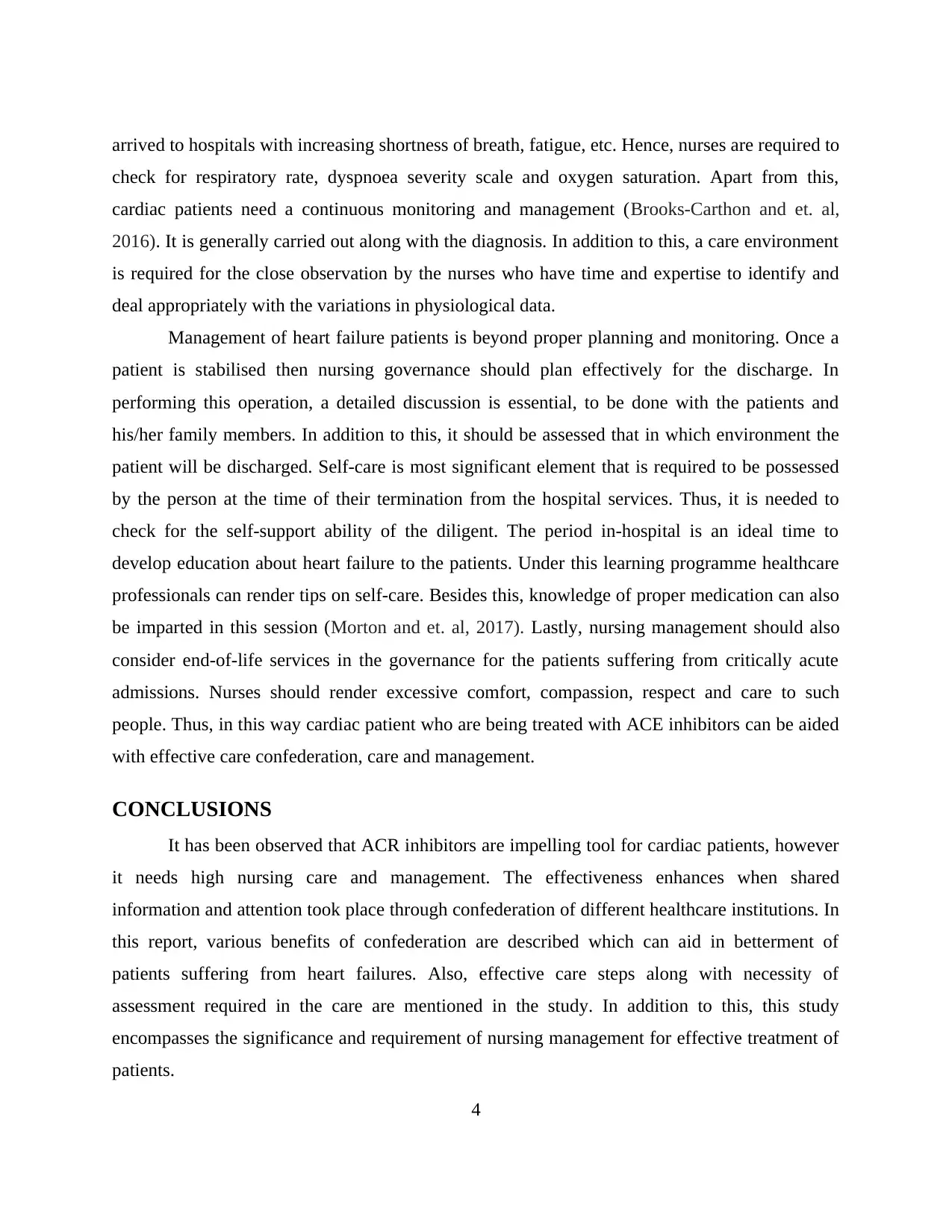
arrived to hospitals with increasing shortness of breath, fatigue, etc. Hence, nurses are required to
check for respiratory rate, dyspnoea severity scale and oxygen saturation. Apart from this,
cardiac patients need a continuous monitoring and management (Brooks-Carthon and et. al,
2016). It is generally carried out along with the diagnosis. In addition to this, a care environment
is required for the close observation by the nurses who have time and expertise to identify and
deal appropriately with the variations in physiological data.
Management of heart failure patients is beyond proper planning and monitoring. Once a
patient is stabilised then nursing governance should plan effectively for the discharge. In
performing this operation, a detailed discussion is essential, to be done with the patients and
his/her family members. In addition to this, it should be assessed that in which environment the
patient will be discharged. Self-care is most significant element that is required to be possessed
by the person at the time of their termination from the hospital services. Thus, it is needed to
check for the self-support ability of the diligent. The period in-hospital is an ideal time to
develop education about heart failure to the patients. Under this learning programme healthcare
professionals can render tips on self-care. Besides this, knowledge of proper medication can also
be imparted in this session (Morton and et. al, 2017). Lastly, nursing management should also
consider end-of-life services in the governance for the patients suffering from critically acute
admissions. Nurses should render excessive comfort, compassion, respect and care to such
people. Thus, in this way cardiac patient who are being treated with ACE inhibitors can be aided
with effective care confederation, care and management.
CONCLUSIONS
It has been observed that ACR inhibitors are impelling tool for cardiac patients, however
it needs high nursing care and management. The effectiveness enhances when shared
information and attention took place through confederation of different healthcare institutions. In
this report, various benefits of confederation are described which can aid in betterment of
patients suffering from heart failures. Also, effective care steps along with necessity of
assessment required in the care are mentioned in the study. In addition to this, this study
encompasses the significance and requirement of nursing management for effective treatment of
patients.
4
check for respiratory rate, dyspnoea severity scale and oxygen saturation. Apart from this,
cardiac patients need a continuous monitoring and management (Brooks-Carthon and et. al,
2016). It is generally carried out along with the diagnosis. In addition to this, a care environment
is required for the close observation by the nurses who have time and expertise to identify and
deal appropriately with the variations in physiological data.
Management of heart failure patients is beyond proper planning and monitoring. Once a
patient is stabilised then nursing governance should plan effectively for the discharge. In
performing this operation, a detailed discussion is essential, to be done with the patients and
his/her family members. In addition to this, it should be assessed that in which environment the
patient will be discharged. Self-care is most significant element that is required to be possessed
by the person at the time of their termination from the hospital services. Thus, it is needed to
check for the self-support ability of the diligent. The period in-hospital is an ideal time to
develop education about heart failure to the patients. Under this learning programme healthcare
professionals can render tips on self-care. Besides this, knowledge of proper medication can also
be imparted in this session (Morton and et. al, 2017). Lastly, nursing management should also
consider end-of-life services in the governance for the patients suffering from critically acute
admissions. Nurses should render excessive comfort, compassion, respect and care to such
people. Thus, in this way cardiac patient who are being treated with ACE inhibitors can be aided
with effective care confederation, care and management.
CONCLUSIONS
It has been observed that ACR inhibitors are impelling tool for cardiac patients, however
it needs high nursing care and management. The effectiveness enhances when shared
information and attention took place through confederation of different healthcare institutions. In
this report, various benefits of confederation are described which can aid in betterment of
patients suffering from heart failures. Also, effective care steps along with necessity of
assessment required in the care are mentioned in the study. In addition to this, this study
encompasses the significance and requirement of nursing management for effective treatment of
patients.
4
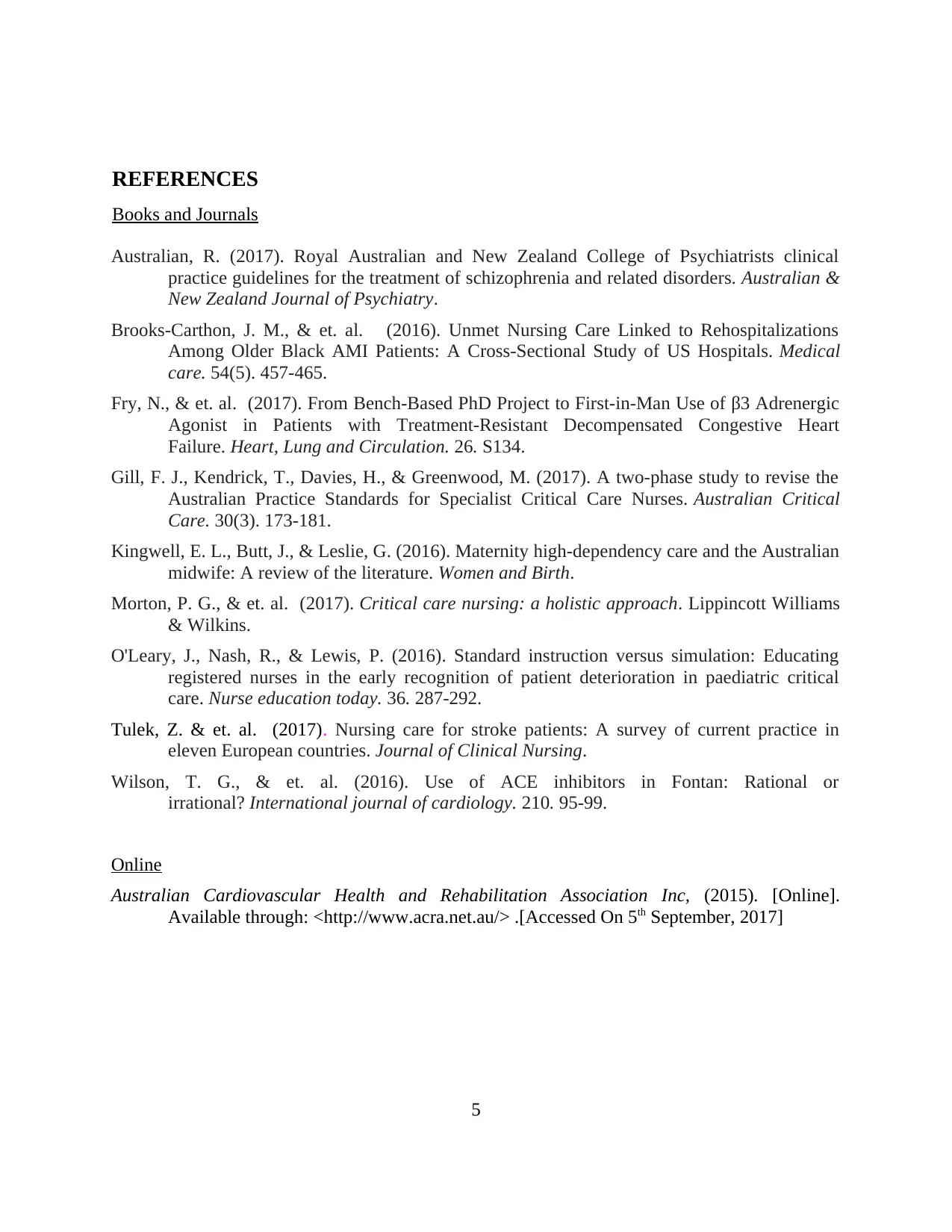
REFERENCES
Books and Journals
Australian, R. (2017). Royal Australian and New Zealand College of Psychiatrists clinical
practice guidelines for the treatment of schizophrenia and related disorders. Australian &
New Zealand Journal of Psychiatry.
Brooks-Carthon, J. M., & et. al. (2016). Unmet Nursing Care Linked to Rehospitalizations
Among Older Black AMI Patients: A Cross-Sectional Study of US Hospitals. Medical
care. 54(5). 457-465.
Fry, N., & et. al. (2017). From Bench-Based PhD Project to First-in-Man Use of β3 Adrenergic
Agonist in Patients with Treatment-Resistant Decompensated Congestive Heart
Failure. Heart, Lung and Circulation. 26. S134.
Gill, F. J., Kendrick, T., Davies, H., & Greenwood, M. (2017). A two-phase study to revise the
Australian Practice Standards for Specialist Critical Care Nurses. Australian Critical
Care. 30(3). 173-181.
Kingwell, E. L., Butt, J., & Leslie, G. (2016). Maternity high-dependency care and the Australian
midwife: A review of the literature. Women and Birth.
Morton, P. G., & et. al. (2017). Critical care nursing: a holistic approach. Lippincott Williams
& Wilkins.
O'Leary, J., Nash, R., & Lewis, P. (2016). Standard instruction versus simulation: Educating
registered nurses in the early recognition of patient deterioration in paediatric critical
care. Nurse education today. 36. 287-292.
Tulek, Z. & et. al. (2017). Nursing care for stroke patients: A survey of current practice in
eleven European countries. Journal of Clinical Nursing.
Wilson, T. G., & et. al. (2016). Use of ACE inhibitors in Fontan: Rational or
irrational? International journal of cardiology. 210. 95-99.
Online
Australian Cardiovascular Health and Rehabilitation Association Inc, (2015). [Online].
Available through: <http://www.acra.net.au/> .[Accessed On 5th September, 2017]
5
Books and Journals
Australian, R. (2017). Royal Australian and New Zealand College of Psychiatrists clinical
practice guidelines for the treatment of schizophrenia and related disorders. Australian &
New Zealand Journal of Psychiatry.
Brooks-Carthon, J. M., & et. al. (2016). Unmet Nursing Care Linked to Rehospitalizations
Among Older Black AMI Patients: A Cross-Sectional Study of US Hospitals. Medical
care. 54(5). 457-465.
Fry, N., & et. al. (2017). From Bench-Based PhD Project to First-in-Man Use of β3 Adrenergic
Agonist in Patients with Treatment-Resistant Decompensated Congestive Heart
Failure. Heart, Lung and Circulation. 26. S134.
Gill, F. J., Kendrick, T., Davies, H., & Greenwood, M. (2017). A two-phase study to revise the
Australian Practice Standards for Specialist Critical Care Nurses. Australian Critical
Care. 30(3). 173-181.
Kingwell, E. L., Butt, J., & Leslie, G. (2016). Maternity high-dependency care and the Australian
midwife: A review of the literature. Women and Birth.
Morton, P. G., & et. al. (2017). Critical care nursing: a holistic approach. Lippincott Williams
& Wilkins.
O'Leary, J., Nash, R., & Lewis, P. (2016). Standard instruction versus simulation: Educating
registered nurses in the early recognition of patient deterioration in paediatric critical
care. Nurse education today. 36. 287-292.
Tulek, Z. & et. al. (2017). Nursing care for stroke patients: A survey of current practice in
eleven European countries. Journal of Clinical Nursing.
Wilson, T. G., & et. al. (2016). Use of ACE inhibitors in Fontan: Rational or
irrational? International journal of cardiology. 210. 95-99.
Online
Australian Cardiovascular Health and Rehabilitation Association Inc, (2015). [Online].
Available through: <http://www.acra.net.au/> .[Accessed On 5th September, 2017]
5
1 out of 7
Related Documents
Your All-in-One AI-Powered Toolkit for Academic Success.
+13062052269
info@desklib.com
Available 24*7 on WhatsApp / Email
![[object Object]](/_next/static/media/star-bottom.7253800d.svg)
Unlock your academic potential
© 2024 | Zucol Services PVT LTD | All rights reserved.





